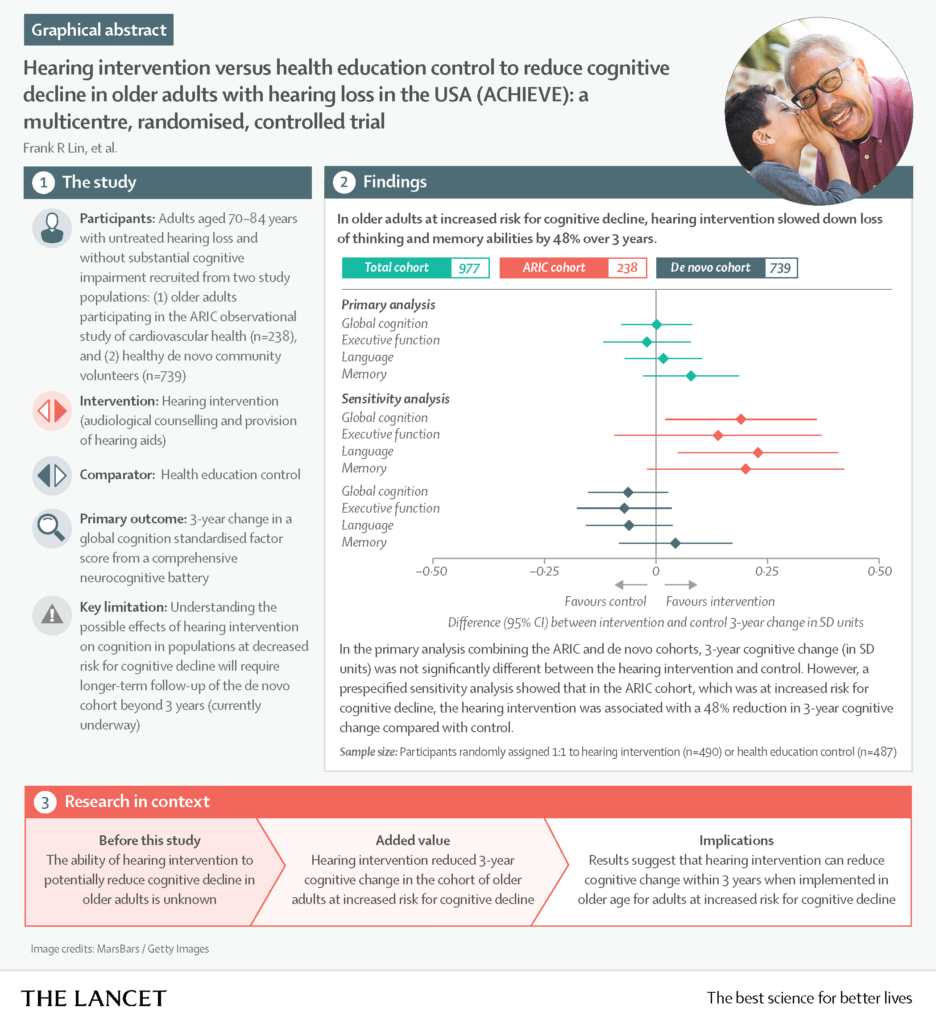Hearing intervention in people with a higher risk of developing cognitive decline could reduce that risk by as much as 48% over 3 years, new research has suggested.
This major US study published on The Lancet, is the first piece of research to show the impact of hearing intervention on reducing the rate of cognitive decline. It echoes research published earlier this year using UK data that showed hearing aid use is associated with a risk of dementia of a similar level to that of people without hearing loss. See Lancet study synopsis below:

Credit: The Lancet
Previous studies have highlighted a potential association between untreated hearing loss in middle age and the later risk of dementia and more evidence continues to emerge for hearing loss as a modifiable risk factor in the development of dementia. One large 2020 study found that hearing loss accounts for 8% of global dementia cases, making it the largest modifiable risk factor for dementia at a population level.
Yet while research has established that hearing loss is a major risk factor for the development of dementia, the impact of hearing intervention in attenuating that risk had not been properly explored, noted lead investigator and professor at Johns Hopkins University School of Medicine and the Bloomberg School of Public Health, Professor Frank Lin.
Two groups of participants – healthy volunteers and adults aged 65+ participating in an ongoing observational study of cardiovascular health – were randomly assigned to either a control group that received health education on chronic disease prevention or a hearing intervention group that received treatment from an audiologist and hearing aids. The primary endpoint was the three-year change in a global cognition standardised factor score from a comprehensive neurocognitive battery of tests.
It was observed that the three-year cognitive change was not significantly different between the hearing intervention and health education control groups overall; however, a significant difference was seen when the researchers looked specifically at the 65+ adults at higher risk of cognitive decline – the rate of cognitive decline was slowed by 48% in this group when compared with the group who had just received health education.
“These results provide compelling evidence that treating hearing loss is a powerful tool to protect cognitive function in later life, and possibly, over the long term, delay a dementia diagnosis,” said Professor Lin in a press release. “Hearing loss is very treatable in later life, which makes it an important public health target to reduce risk of cognitive decline and dementia,” he added.
An accompanying editorial in The Lancet echoed the importance of these findings, calling them “hopeful”. “Overall, the findings from this study are hopeful,” wrote the authors. “Hearing aids could really make a difference for populations at risk of dementia.”
The findings have led to calls for hearing health to be prioritised as a modifiable risk factor for cognitive decline and dementia, given that they reinforce earlier research in this area. For example, the association between hearing aid use and dementia was also investigated earlier this year by Chinese researchers using UK data, which showed that hearing aid use is associated with a risk of dementia of a similar level to that of people without hearing loss. Their analysis found that when compared with participants without hearing loss, people with hearing loss without hearing aids had an increased risk of all-cause dementia vs no increased risk in people with hearing loss with hearing aids. The authors of the study, which was also published in The Lancet, estimated that the risk proportion of dementia for hearing loss was almost 30%.
While experts agree that further research in this area is needed, such studies have brought further clarity to the hypothesis that something as simple as hearing aid use could be an effective means of mitigating the risk of cognitive decline and future dementia. EHIMA continues to advocate for the strong social value proposition of hearing aid adoption, particularly within the context of an ageing society, given their myriad positive benefits such as enabling independent living, healthy ageing, keeping people active and empowered, preventing of involuntary retirement and low job performance.

